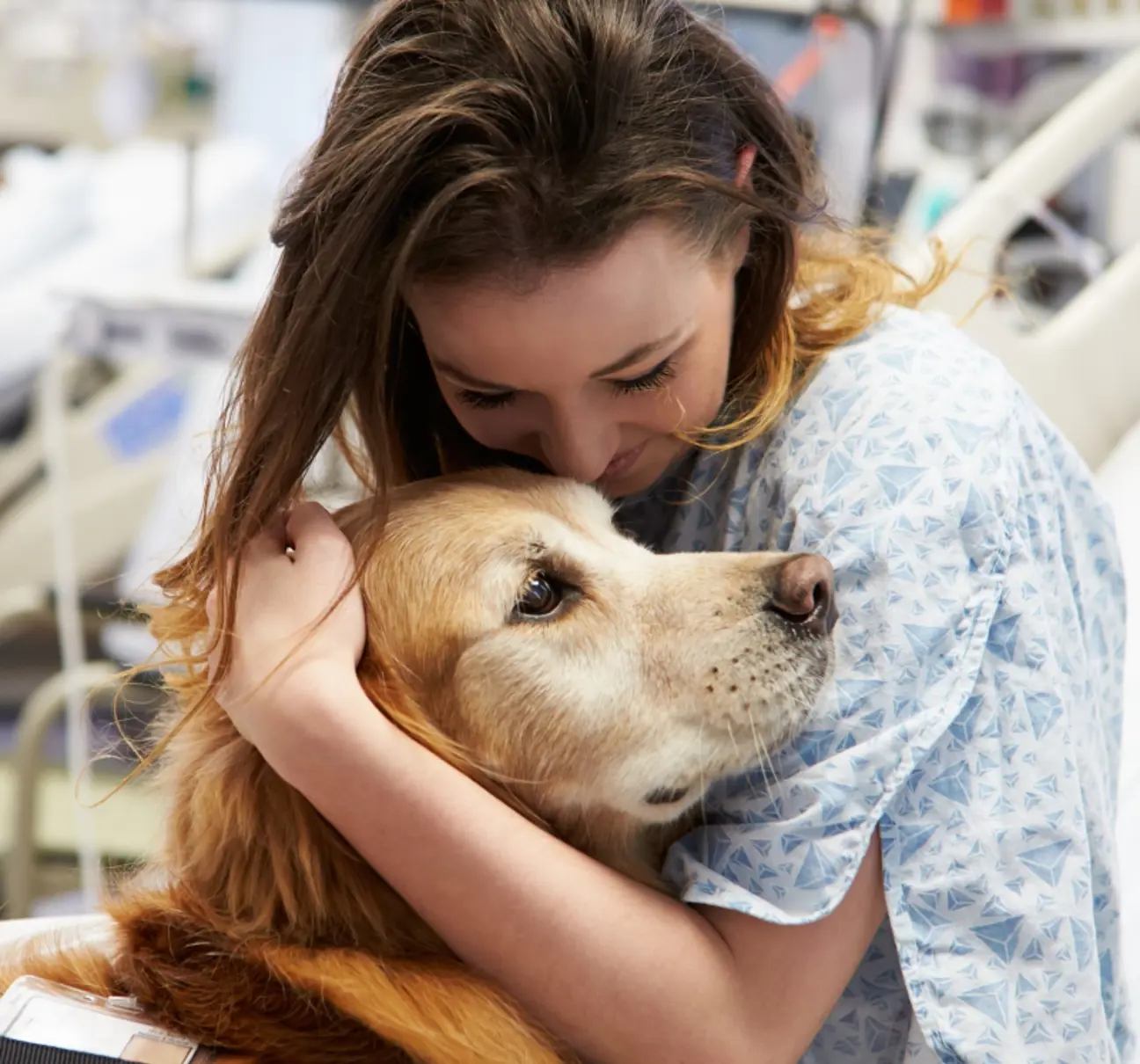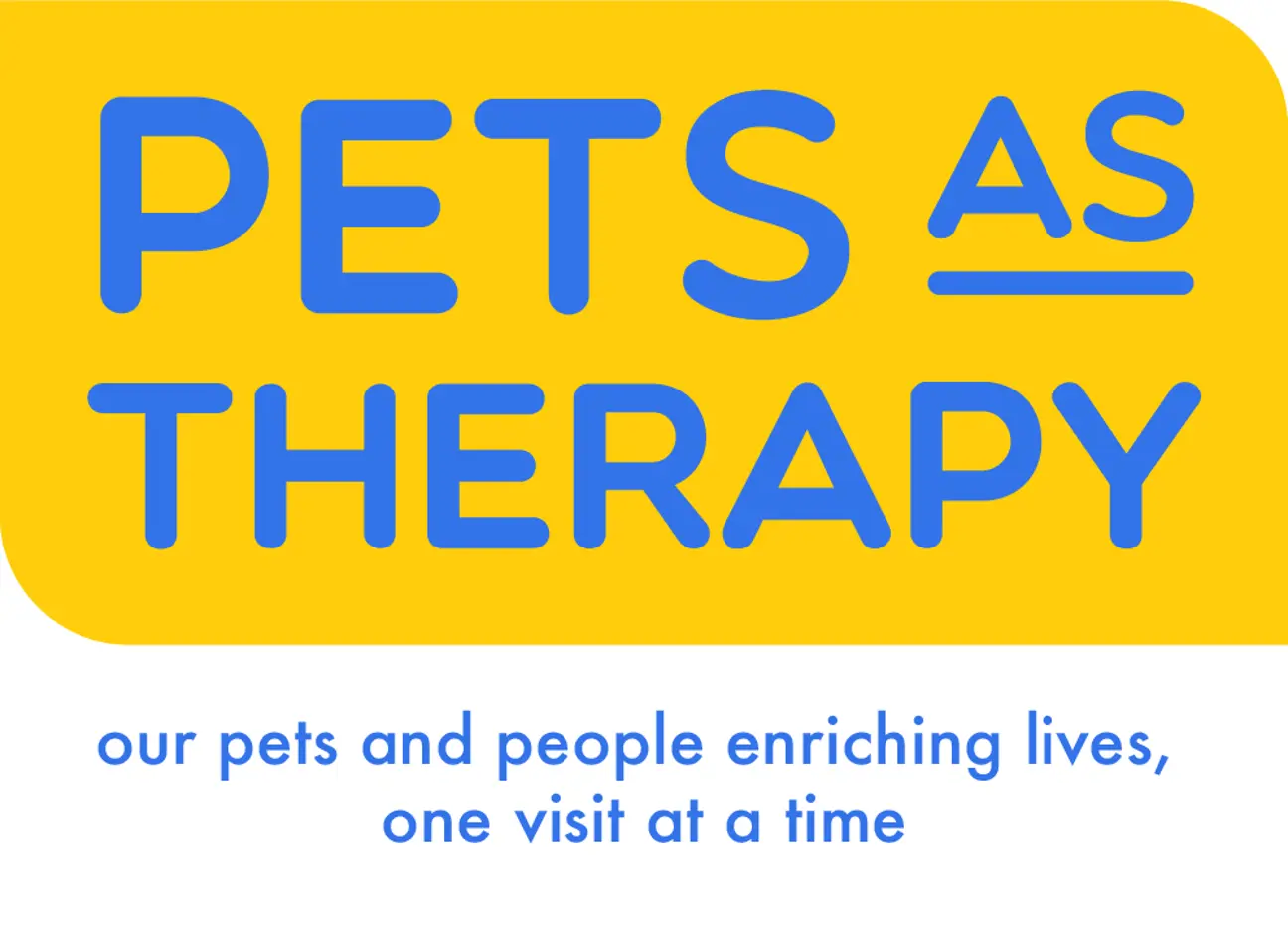The Role Of Therapy Dogs Within Our NHS
Our furry friends play an important role delivering care for patients in hospitals.

This is Boo, a proud member of the Dynamic Training team, who regularly attends events at NHS hospitals with our team as we discuss apprenticeships and training opportunities available to staff. At 17 years old, he is a valued and trusted member of Dynamic Training with plenty of experience behind his cute and cuddly appearance.
Beyond simply supporting Dynamic Training, Boo is also a former therapy dog. Therapy dogs are an inspiring group of furry friends, who play an active role role in supporting individuals within schools, hospitals or care homes by providing their love and care to those who need it.
Therapy dogs play an important role within hospital settings, such as within the National Health Service, in particular. As people find themselves in hospitals for all kinds of reasons, a little love from our furry friends can go a long way to providing comfort, joy, and calmness to those in need. As an adult training specialist, with expertise within healthcare training, Dynamic Training have seen the truly amazing work which therapy dogs do up close, and the impact they can have on patients.
In this article, we will explore the role which therapy dogs have within hospitals, discuss the current roles of therapy dogs within the National Health Service, and how you can get involved in supporting therapy dogs within our hospitals, either by donating or volunteering yourself towards this amazing cause.
What Role Do Therapy Dogs Play Within The NHS?
One of the most significant contributions of therapy dogs in NHS hospitals is their ability to reduce patient anxiety and stress levels. The hospital environment can be overwhelming or stressful for many, despite the caring support of our health and care staff. Therapy dogs provide a soothing presence which helps patients relax, lowering their blood pressure and releasing endorphins which contribute to a sense of wellbeing.
Studies have shown that interacting with therapy dogs can reduce cortisol levels, the hormone associated with stress, and increase oxytocin production, promoting feelings of trust and comfort.
Beyond their physiological benefits, therapy dogs also enhance emotional and mental wellbeing. Hospitalisation can be isolating, with patients sometimes feeling disconnected from their usual routines and support networks. Therapy dogs bridge this gap by providing companionship and unconditional love.
It is not just patients who benefit from therapy dogs, however. Hospital staff members also experience positive effects from these furry volunteers. Working in healthcare can be a demanding role, one which rightly earns admiration and respect. Boo himself regularly gets to entertain NHS staff at events, a job he thoroughly enjoys.
Earlier in the year, we spoke with Pets As Therapy, a UK-wide charity with over 5,000 registered volunteers who deliver this support within in hospitals, schools, care homes and other community areas. They were more than happy to help explain the impacts these therapy dogs have:
"When a Pets At Therapy Dog visits a hospital ward, patients tell us that their stress levels reduce and it's a joy to interact with a pet, especially if they are missing their own family pet back home. Children who may be fearful of an operation or medical procedure get distracted by a comforting four-legged friend, which allows concerned parents to relax a little too.
"Visits by Pets As Therapy Teams also boost the mental health of patients, as well as visitors and hospital staff. Pets As Therapy hospital visits are coordinated by the Volunteer Services Team for each NHS Trust."
How Are Therapy Dogs Chosen?
Becoming a Therapy Dog is a surprisingly easy process, open to dog owners across the United Kingdom. Therapy dogs like Boo complete an assessment, which tests their friendliness, sociability and calmness to ensure that they are qualified for their job in providing love and support. Being a sociable and naturally calm dog, Boo had no problems passing his tests with flying colours.
Is is also not only dogs who get to take part in therapy, however. Cats are also able to take up a therapy role and help provide love and support within settings such as hospitals and care homes.
Pets As Therapy:
"Pets As Therapy Pets come in all shapes and sizes, and can be a pedigree or a crossbreed, though we don’t accept dogs that are listed under the Dangerous Dogs Act 1991. Dogs must be at least a year old, and owners must have known them for at least nine months.
"Our volunteers are simply pet owners who want to share the love of their dog or cat with others, and give up their own time to do so. The pets don’t need to have any special training. They just need to be healthy, calm, friendly and well-groomed animals who like being with people and enjoy the attention they get. Pets As Therapy does ask that all pets are temperament assessed by one of our Pets As Therapy assessors, to make sure they are suitable."
How Common Are Therapy Dogs Within The NHS?
Given that Therapy dogs are comprised of volunteers, it ultimately depends on the availability of the fantastic volunteers and their pets as to how many visits are made to NHS Trusts, private hospitals, care homes and schools up and down the country, as well as the work of charities such as Pets As Therapy.
Dynamic Training has been fortunate to see therapy dogs in action within our NHS. Pets As Therapy have noted an increase within the numbers overall within both hospitals and care homes, as well as waiting lists for PAT teams, which is a really promising sign for the future of therapy dogs within our hospitals.
Given the pressures which exist on the NHS, however, and the diverse challenges faced by many within the care system, there is no denying the positive impact which further growth can bring. More therapy dogs can help support our hospitals, their staff and, of course, the patients themselves. We therefore encourage everyone to think about how they can get involved in what is a wonderful cause. More information on how you can do this can be found below.
Pets As Therapy:
The recognition that animals can provide support to people in many different ways has led to an increase in the number of health and social care settings where pets are present. Many care homes have encouraged regular visits from dogs and cats and increasingly hospitals are introducing pets into settings where they play a variety of roles.
Pets As Therapy currently visits 300 healthcare settings, but we want to visit more: we have a waiting list of places that would love a PAT Team of their own. We’re always looking for new volunteers.
Last year our Pets As Therapy Volunteers carried out approximately 168,500 visits.
Around 30,000 people every week have the pleasure of meeting a Pets As Therapy Pet.
We have 5,443 PAT Dogs and 30 PAT Cats.


How Can I Support Therapy Dogs Within The NHS?
Pets As Therapy (PAT) is a UK-wide charity with over 5,000 registered volunteers who bring joy, comfort and companionship to people in hospitals, schools, care homes and other places in the community through visits with their pet dog or cat.
You can find out more about Pets As Therapy, how you can support them, on their website through the link below.

Why Not Become A Volunteer With Your Own Dog?
Do you know a pooch who would like to try their paws at therapy? You and your dog can join in the volunteering. The first step is to get your dog assessed.
Information on this process can be found from the link below.
Dynamic Training will continue to support our furry friends within our NHS in future, and encourage you to help support our therapy dogs as well! More information about how we will be supporting therapy dogs with our own fundraising and activities will follow in the coming weeks and months.
To keep up-to-date with our blogs, guides, and industry developments, follow us on LinkedIn, Instagram or Facebook.
All of the Apprenticeships and Workshops we offer are purpose-built with accessibility and inclusion in mind. You can view our apprenticeships, view our courses or contact us to find out more about how we can empower you or your workforce with apprenticeships or training programmes.
About Dynamic Training
Dynamic Training are an apprenticeship, adult education, and bespoke training specialist. Working with a diverse customer base across a variety of sectors, with a significant presence within the healthcare sector, we believe passionately in providing high-quality and inclusive education at all times, empowering both employers and employees to reach their aspirations.
Dynamic Training have an incredibly passionate and experienced team of coaches, with a diverse range of industry experiences, who aspire to deliver the very best training and support. We stand out from other training providers through our strong commitment to accessible education, as well as our prestige within the healthcare sector.



Dynamic Training are experts in Healthcare Education. Follow our blog for the latest industry news, insight and advice from industry experts.

Dynamic Training has an expert team of trainers delivering high-quality apprenticeships across the health, social care and business sectors, making sure you get the best out of your workforce.

Dynamic Training cares deeply about creating an inclusive and accessible enviroment for our learners. We have a proud record of getting the best out of every learner and adjusting our training to suit them.
Learn more about how Dynamic Training has provided a positive and inclusive learning environment.

Job Title: Marketing Specialist